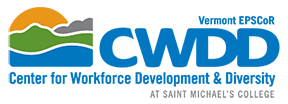On Sunday, May 22nd, thirty-three undergraduate students started their Summer Internships. Beginning with a comprehensive orientation, students learned about the VT EPSCoR Adaptation to Climate Change Research in the Lake Champlain Basin (RACC) program, and participated in several teambuilding exercises. Interns were introduced to their specific RACC research question, and through conversations with their mentors, gained understanding of how their research would tie into the bigger picture.
Dr. Christopher Koliba provided an introduction to the goals and products of RACC over the last five years. Following the presentation, roundtable discussions were held. These discussions allowed interns to learn not only about their own RACC Questions, but to learn what other interns would be researching over the summer as well, and how all of the questions are linked. A quick transition after lunch brought interns to the UVM ropes course at Farrell Park. At the ropes course, interns learned the value of teamwork, and discovered that a variety of skills is required to be successful during the internship.
Interns were able to see both projects funded through the NSF EPSCoR Track-1 and Track-2 NEWRnet (NorthEast Water Resources Network) and RACC technology during a “forest-farm-lake” field trip of the Missisquoi River basin. This watershed tour was led by Drs. Andrew Schroth, Steve Scheinert and Declan McCabe. While visiting various tributaries of the Missisquoi River, as well as the river itself, interns were able to see, first hand, the effects of phosphorus on the river, and how the effects vary from a forested stream; to a stream in close proximity to a farm. Interns also learned about some of the policies in place to help control the potentially negative effects of some farming practices on rivers, and how effective best practices can work hand in hand with policy makers. The field trip culminated with a visit to the Missisquoi Bay, where algal blooms frequently grow in late summer.
A Climate Change Workshop led by Drs. Carol Adair and Alan Betts followed the next day. The lectures addressed climate change, assumptions around the terminology, as well as data showing current trends. Students engaged in a lively discussion. After lunch, interns enjoyed a hike at Lone Rock Point in Burlington, VT. There, they were able to observe Lake Champlain, New York’s Adirondack Mountains, and the Champlain Thrust Fault, a portion of the Point in which older rock had been thrust on top of newer rock.
The final day of orientation began with a library lecture at UVM to help interns learn where to find resources for their summer research. After the long Memorial Day weekend, interns jumped right into the internships, kicking off with their first workshop of the summer.
